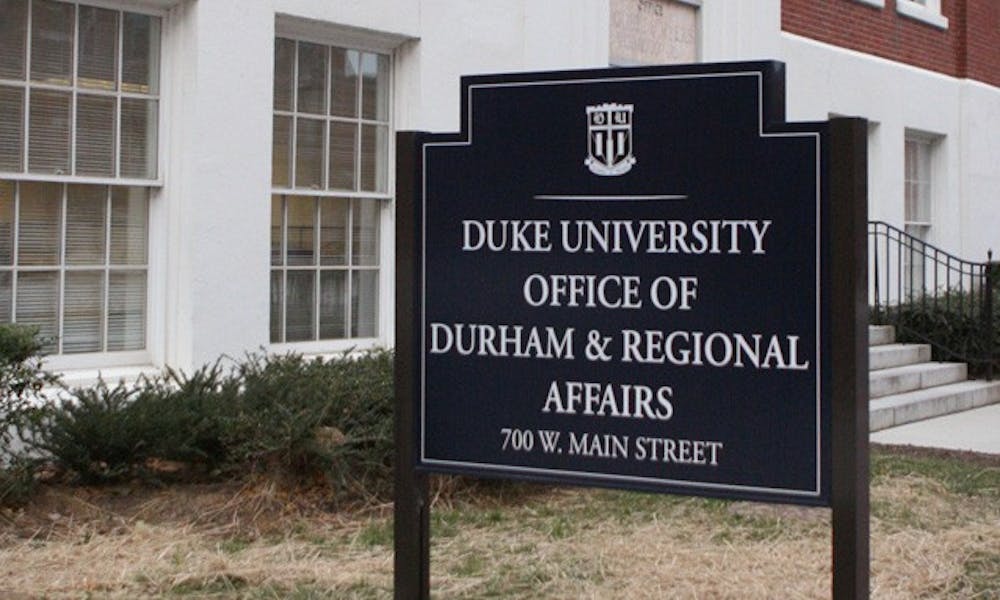After a significant loss of outside funding, Duke has less money and fewer people dedicated to engaging the Durham community.
Late last year, the Duke Endowment decided to stop funding the Duke-Durham Neighborhood Partnership, an organization that works in the 12 neighborhoods closest to campus to improve quality of life and educational achievement. In response to the funding cuts, along with broad economic pressures, the University chose to eliminate two positions within the Office of Community Affairs, one of which belonged to Michael Palmer, who served as assistant vice president for community affairs and managed the partnership since 1999.
The office now finds itself with considerably less resources available for community engagement.
Phail Wynn, vice president for Durham and regional affairs, said the Charlotte-based Duke Endowment, a private foundation that seeks to support social welfare programs throughout the Carolinas, had provided the partnership with about $677,000 annually—a substantial portion of the community affairs budget—before it decided to terminate funding.
“Essentially, that was all of our program and community engagement monies,” Wynn said. “What we’re doing in the neighborhoods, what we’re doing in the schools, that was program money being provided by the Duke Endowment.”
Wynn said he is concerned that the loss of funding could limit the Neighborhood Partnership’s ability to function in Durham at the same level it has in past years. Still, he noted, he is grateful for the endowment’s 14 years of funding and remains hopeful that the partnership can continue to locate alternate funding elsewhere.
In a community newsletter released after the cuts were made public in December, Wynn praised Palmer as a dedicated servant to the community and lauded his “commitment to the revitalization of the surrounding neighborhoods and to improving relations between the University and the neighborhoods.” Wynn said the other eliminated position belonged to a staff assistant who took another position at the University, though he declined to name the individual.
Palmer’s dismissal, he said, was prompted by the Duke Endowment’s decision to stop funding the partnership.
The endowment declined to comment on the reasoning behind its decision, but Vice President of Communications Charity Perkins stressed that 15 years is an unusually long time for the endowment to support a single grant.
Palmer speaks
Palmer said in an interview he was “disappointed but not shocked” with Duke’s decision to let him go.
He said he understood universities’ need to balance priorities when confronted with economic challenges but expressed concern that a smaller Office of Community Affairs will not be able to operate as it did before. He noted that during his time at Duke, the office distributed resources to approximately 300 other organizations; now, he said, it no longer has that capacity.
Palmer stressed that Duke’s fate is inextricably tied to Durham and noted that progressive universities recognize the importance of improving their communities.
He added that he refused the alternate jobs offered to him by Duke after his position was eliminated because he felt they would limit his ability to work in Durham. He said he continues to work in the Bull City and sits on the boards of several non-profit organizations geared toward community development.
“I’m still working in Durham,” he said. “I’m just not wearing my Duke hat anymore.”
Durham’s reaction
Bull City residents have received the cuts with disappointment.
Calvary Ministries, which partnered with Duke to run an after-school program for Durham students in kindergarten through sixth grade, has received “$6,000 or $7,0000” less in funding since the cuts, said its executive director, Rebecca Oats.
Get The Chronicle straight to your inbox
Sign up for our weekly newsletter. Cancel at any time.
“This year, we’ve not been able to provide enrichment for the kids,” she said. “We used to try to give them experiences in [educational] enrichment activities—we’ve had to cut back considerably on those.”
Community leaders were also disappointed with the University’s decision to downsize the Office of Community Affairs and expressed particular dismay with the loss of Palmer.
“Unless they find someone to do what he was doing—and it takes a personality to do that—I think it’s a tremendous loss, personally,” Durham Mayor Bill Bell said. “I understand that organizations have to do what they have to do, but I think [Palmer] brought a great credibility to the [partnership] and more importantly, he had the support of the community that Duke was serving—and I think that’s the loss.”
Executive Vice President Tallman Trask, who is the University’s chief administrative and fiscal officer, declined to comment on Palmer’s departure and referred all comments on the cuts to the Duke Endowment.
Pastor Fredrick Davis, who preaches at First Calvary Baptist Church in Durham and worked extensively with Palmer in the community, sent a letter in December to President Richard Brodhead and others expressing his “disgust and disappointment” with Palmer’s dismissal and the University’s failure to properly acknowledge Palmer’s work.
“Words cannot truly express how saddened and disheartened I am by this situation,” he wrote. “In the 19 years I have served in this community I have never heard of such an appalling state of affairs.”
The pastor described Palmer in an interview as a “true servant and warrior of Durham, North Carolina.”
“He brought to that position a sensitivity and a cultural understanding that was beyond the conception of the [partnership],” he added.

